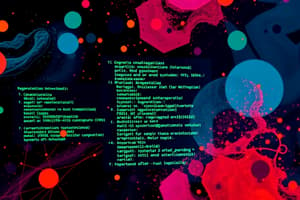Podcast
Questions and Answers
What services does an operating system provide to users?
What services does an operating system provide to users?
User interface, program execution, I/O operations, file-system manipulation, communications, error detection.
Which of the following is NOT a type of user operating system interface?
Which of the following is NOT a type of user operating system interface?
- Graphics User Interface (GUI)
- Batch Processing
- Multitasking (correct)
- Command-Line Interface (CLI)
Program execution requires the system to load a program into memory and run it.
Program execution requires the system to load a program into memory and run it.
True (A)
The system must be able to end program execution either normally or __________.
The system must be able to end program execution either normally or __________.
Which type of operation may require input/output (I/O)?
Which type of operation may require input/output (I/O)?
What are the mechanisms for communication between processes?
What are the mechanisms for communication between processes?
The operating system does not need to detect errors in CPU or memory.
The operating system does not need to detect errors in CPU or memory.
What is the purpose of resource allocation in operating systems?
What is the purpose of resource allocation in operating systems?
What role does accounting play in operating systems?
What role does accounting play in operating systems?
What is the main goal of protection and security in an operating system?
What is the main goal of protection and security in an operating system?
Flashcards are hidden until you start studying
Study Notes
Operating System Services
- User Interface: Providing an interface for users to interact with the operating system. Examples include Command-Line Interface (CLI) and Graphics User Interface (GUI).
- Program Execution: Enabling the loading of programs into memory and their execution, including terminating execution normally or abnormally (due to errors).
- I/O Operations: Managing input and output operations, including file access and interaction with I/O devices.
- File-System Manipulation: Providing functions to create, delete, read, write, search, and list files and directories. Also includes managing file permissions.
- Communications: Facilitating the exchange of information between processes within the same computer or across networks, using mechanisms such as shared memory or message passing.
- Error Detection: Monitoring potential errors in the CPU, memory hardware, I/O devices, and user programs. The operating system takes appropriate actions to resolve errors and maintain system consistency.
- Resource Allocation: Managing the allocation of resources (CPU cycles, memory, file storage, I/O devices) to users or programs that are running concurrently.
- Accounting: Tracking the usage of computer resources by users and programs.
- Protection and Security: Controlling access to system resources and protecting the system from unauthorized access. This includes enforcing user authentication and protecting external I/O devices.
Studying That Suits You
Use AI to generate personalized quizzes and flashcards to suit your learning preferences.




